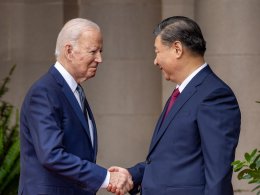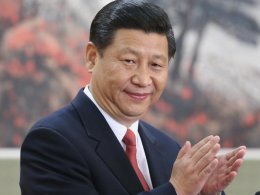President Yoon Suk-yeol and his U.S. counterpart Joe Biden reaffirmed the allies' determination, Sunday, to deter North Korea's growing nuclear and missile threats and the importance of the bilateral alliance during their visit to a key Air Force operations center in Pyeongtaek, Gyeonggi Province, the final stop of the American leader's three-day trip to Seoul.
The two heads of state toured the Korean Air and Space Operations Center (KAOC) at Osan Air Base and met with American and South Korean troops stationed there. Biden was the first U.S. president to visit the center, which is situated in an underground bunker and serves as a key command post for air and space operations, while Yoon was the first South Korean president to do so in 13 years.
The visit came as part of efforts for the allies to stress their military readiness against intensifying threats from Pyongyang, as highlighted by their agreement during a summit Saturday to "expand the scope and scale of combined military exercises and training on and around the Korean Peninsula."
According to their joint statement, Biden even agreed to use nuclear weapons if necessary to defend South Korea.
Appreciating U.S. troops' service away from home, Yoon said the KAOC is a symbol of the robust South Korea-U.S. alliance that plays a critical role in both countries responding to North Korea's increasing nuclear and missile threats.
"The KAOC is the center of [South] Korea's three-axis defense system to defend against the North Korean missile threat. And I would like to mention the importance of your role and responsibility to defend the security of this peninsula," Yoon said.
The three axes refer to: the Korea Massive Punishment and Retaliation (KMPR), an operational plan to incapacitate the North Korean leadership in a major conflict, the Kill Chain pre-emptive strike platform and the Korea Air and Missile Defense system (KAMD). During the campaign, Yoon vowed to spur the establishment of the three-axis system.
Biden also touted the alliance, saying that integration and coordination between the two countries' forces will play an essential role in the future.
He also said maintaining stability on the peninsula will contribute to prosperity and security around the world.
After touring the KAOC, the two leaders bade farewell to each other at the lobby and traded a thumbs-up as Biden's limousine left.
After encouraging American troops at the air base, Biden flew to Japan, where he will participate in the Quad Leaders' Summit and the launching ceremony of the U.S.-led Indo-Pacific Economic Framework (IPEF).
Meanwhile, South Korea's rival political parties offered mixed responses to the results of the Yoon-Biden summit. The ruling side said the security alliance has matured into a deep and comprehensive strategic relationship, while the opposition bloc said there were no tangible outcomes, expressing concerns over the possible fallout from China.
"The joint statement is a determination by South Korea and the U.S. to expand the bilateral alliance from strengthening the traditional security alliance to an economic alliance for the future and furthermore to an alliance sharing the universal values of liberal democracy and human rights," said Rep. Kim Hyung-dong, a spokesman of the ruling People Power Party.
"This joint statement is significant as the bilateral relations have developed into a 'global comprehensive strategic alliance' beyond the Korean Peninsula and Northeast Asia."
Despite hoping that the summit will help the two countries expand the range of bilateral cooperation in the era of economic security, Rep. Koh Yong-jin, a spokesman for the main opposition Democratic Party of Korea, said South Korea's decision to join the U.S.-led Indo-Pacific Economic Framework (IPEF) may face a backlash from China, which has publicly expressed concerns over the initiative, aimed at purportedly countering Beijing's growing influence in the region.
"We hope that the Yoon administration will have enough countermeasures against possible fallout from giving up a balanced diplomacy," he said.
The spokesman criticized the summit for failing to come up with creative measures to resolve the North Korean nuclear crisis.
The minor Justice Party also said Yoon's first and much-trumpeted South Korea-U.S. summit ended up with less impact or significance than expected.
Although the Chinese government has yet to comment on the summit results, its state-run media outlet had been critical of Biden's Asia trip, which mainly targets China.
The Global Times said in a Friday article that it was rare to see Biden make South Korea the first leg of his Asia trip before Japan, adding that it was aimed at pulling Seoul into its strategies to contain Beijing.
It also said it remains to be seen if Korea will benefit from the IPEF.










